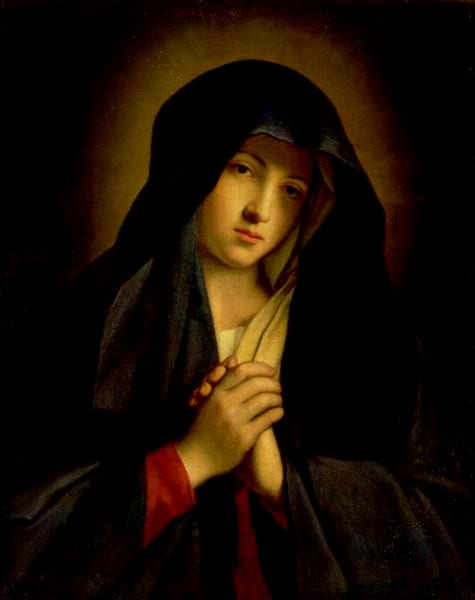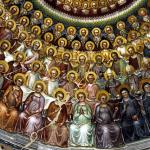
Protestant apologist Jason Engwer wrote:
Tertullian and Helvidius are often named as early opponents of Mary’s perpetual virginity, but other opponents of the concept seem to be mentioned less often. . . . What I want to do in this post is cite some other examples.
In the West before Hilary – that is, up to the middle of the fourth century – there is no witness at all for the ‘semper virgo’ [perpetual virginity]; and that can hardly be a mere chance: see pp. 72 f. below. Hippolytus, too, regards the ‘brothers of Jesus’ as the children of Joseph and Mary… [apparently quoting Hippolytus:] ‘He [Jesus] did [not] acknowledge as brothers those who were regarded as his brothers according to the body; the Redeemer did not acknowledge them, because in truth those [were] not his brothers who were born from Joseph through seed, but he from the Virgin and the Holy Spirit; and they regarded them as his brothers, but he did not acknowledge them.’ (Hans von Campenhausen, The Virgin Birth In The Theology Of The Ancient Church [Eugene, Oregon: Wipf & Stock, 2011], n. 4 on 48-9)
. . . what should we conclude from the English translation he provides of that one passage?
If the brothers were “born from Joseph through seed”, then Hippolytus at least believed they were children of Joseph from a former marriage, thus differing from the more popular view that they were cousins of Jesus or some other more distant type of relatives. But was he denying Mary’s perpetual virginity?
Probably. To reconcile the passage with perpetual virginity, I think we’d have to take a few problematic steps. We’d have to assume a prior marriage of Joseph, which would be an unusual scenario and one not implied by the text. Second, if the relatives of Jesus in question were regarded as “brothers” without further qualification, the most natural way to take that term is as a reference to individuals with a biological relationship with both Joseph and Mary. If the individuals were all older than Jesus and older than Joseph’s marriage to Mary, having been born during a former marriage, it’s highly doubtful that they’d all be mistaken for biological offspring of Joseph and Mary. Third, we’d have to assume that Hippolytus failed to mention the first wife of Joseph (by description or name), even though mentioning her would have strengthened his point (by putting even more distance between Jesus and the brothers).
Why, then, does Hippolytus say that the individuals in question were “regarded” as brothers of Jesus? He can’t be denying that they were brothers in any sense. Even in a perpetual virginity scenario involving children from a former marriage of Joseph, the individuals in question would be brothers in a legal context. So, all that Hippolytus seems to be getting at by using the “regarded” qualifier is that the men weren’t brothers in the fullest sense, even though they were thought of that way. That would be true regardless of whether Mary was a perpetual virgin, so it’s an irrelevant issue. (“More Early Opponents Of Mary’s Perpetual Virginity”: Tribalblogue, 11-27-14)
This is classic Engwer polemics: take a dubious proposed “proof” of an assertion he already holds and obfuscate, engage in obscurantism and sophism, special plead, create as much doubt and confusion as possible, as to the traditional Catholic interpretation, and hope that readers (most of whom already agree with him) will be persuaded by such nefarious methods. In this instance, he seems to be aware of how weak and speculative a “proof” he is working with: leading to an excessive amount of special pleading (even by his low standards of research).
Yet, rather than admit as much, he digs in and gives it all he has to try to make his long shot position work. It’s all in vain, because St. Hippolytus (c. 170 – 235) elsewhere calls Mary ever-virgin, which is a definitive indication that she had no other children. Case closed. Thus, much ado about nothing, trying to make this “square peg” passage fit into the “square hole” of Mary’s perpetual virginity. If Jason had spent another ten minutes searching “Hippolytus, perpetual virginity” he could have save himself the embarrassment of trying to make a hopeless argument. But he didn’t, and so I had to write this paper and set the record straight.
Hippolytus wrote, c. 210:
But the pious confession of the believer is that, with a view to our salvation, and in order to connect the universe with unchangeableness, the Creator of all things incorporated with Himself a rational soul and a sensible body from the all-holy Mary, ever-virgin, by an undefiled conception, without conversion, and was made man in nature, but separate from wickedness: the same was perfect God, and the same was perfect man; the same was in nature at once perfect God and man. (Against Beron and Helix, Frag VIII; my bolding)
Likewise, The New Schaff-Herzog Encyclopedia of Religious Knowledge, Volume 12 (“Virgin Birth”), reinforces this view with regard to St. Hippolytus and also St. Clement of Alexandria (c. 150 – c. 215), and Origen (c. 184 – c. 253):
Clement of Alexandria taught unequivocally the virgin birth—the only virgin mother (Pædagogus, i. 6)—and appears inclined to the notion of a miraculous birth as well as a miraculous conception (Strom., vii, 16; Eng. transl. in ANF, vol. ii.). . . .
This doctrine of the perpetual virginity of Mary was advanced a further stage by Origen, whose principal discussion of the virgin birth appears in reply to Celsus, who had assailed this doctrine. . . .
Hippolytus maintained the perfect purity and perpetual virginity of Mary (Adv. Veronem), . . .
The great Protestant scholar J. B. Lightfoot explained what the early Church believed about the perpetual virginity of Mary, in his work, Dissertations on the Apostolic Age (1892; section: “The Brethren of the Lord”):
In the early ages of the Church two conflicting opinions were held regarding the relationship of those who in the Gospels and Apostolic Epistles are termed ‘the brethren of the Lord.’ On the one hand it was maintained that no blood relationship existed; that these brethren were in fact sons of Joseph by a former wife, before he espoused the Virgin; and that they are therefore called the Lord’s brethren only in the same way in which Joseph is called His father, having really no claim to this title but being so designated by an exceptional use of the term adapted to the exceptional fact of the miraculous incarnation. On the other hand certain persons argued that the obvious meaning of the term was the correct meaning, and that these brethren were the Lord’s brethren as truly as Mary was the Lord’s mother, being her sons by her husband Joseph. The former of these views was held by the vast majority of orthodox believers and by not a few heretics; the latter was the opinion of a father of the Church here and there to whom it occurred as the natural inference from the language of Scripture, as Tertullian for instance, and of certain sects and individuals who set themselves against the incipient worship of the Virgin or the one-sided asceticism of the day, and to whom therefore it was a very serviceable weapon of controversy. . . .
Thus it would appear that, taking the scriptural notices alone, the Hieronymian account [that the “brethren” were cousins of Jesus] must be abandoned; while of the remaining two the balance of the argument is against the Helvidian [the “brethren” were literal siblings or blood brothers] and in favour of the Epiphanian [they were sons of a former marriage of Joseph]. To what extent the last-mentioned theory can plead the prestige of tradition, will be seen from the following catena of references to the fathers and other early Christian writings. . . .
[T]he testimony of Hegesippus [c. 110 – c. 180] . . . favours the Epiphanian rather than the Helvidian [view]. . . .
Origen [c. 184 – c. 253]. . . declares himself very distinctly in favour of the Epiphanian view, stating that the brethren were sons of Joseph by a deceased wife. . . .
In one passage he [Origen] writes at some length on the subject; ‘Some persons, on the ground of a tradition in the Gospel according to Peter, as it is entitled, or the Book of James (i.e. the Protevangelium), say that the brothers of Jesus were Joseph’s sons by a former wife to whom he was married before Mary. Those who hold this view wish to preserve the honour of Mary in virginity throughout… And I think it reasonable that as Jesus was the first-fruit of purity and chastity among men, so Mary was among women: for it is not seemly to ascribe the first-fruit of virginity to any other woman but her’ (in Matt. xiii. 55, III. p. 462)’. This passage shows not only that Origen himself favoured the Epiphanian view which elsewhere he has directly maintained, but that he was wholly unaware of the Hieronymian, . . . (pp. 3-4, 25, 31, 34-35)
Jason will have to go back and revise his research, if he wishes to claim Hippolytus (or any of the other fathers above, save the eventual heretic Tertullian) for his heretical and unbiblical (and also anti-Protestant “Reformers”) view of the “brothers of Jesus” allegedly being His blood brothers and sons (younger brothers and/or sisters) of the Blessed Virgin Mary also.
***
Photo credit: The Madonna in Sorrow, by Giovanni Battista Salvi da Sassoferrato (1609 – 1685) [public domain / Wikimedia Commons]
***













